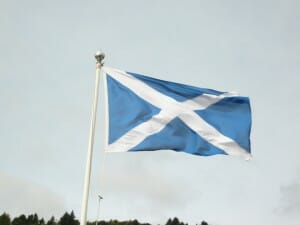
Freedom, fractures, and familiar stories
A Scottish student reflects on the referendum
A Scottish student reflects on the referendum
I’ve been in Halifax for nearly three weeks now, and the amount of people who have informed me that their *insert member of family who has distant Scottish heritage* comes from Scotland is quite astounding. However, this is no surprise considering the history Canada shares with my home country.
It’s not just history we share, though. There is something to say about the similarities between Canada and Scotland on a contemporary level. For those of you who stay up to date with your world affairs, you’ll know that Scotland has just held a referendum on independence:
Should Scotland be an independent country?
Unlike Quebec’s rather extensive referendum question, the Scottish National Party made this decision as simple and clean-cut as possible.
But the outcome is turning out to be anything but clean-cut: it has virtually divided our country in two, with a 45 per cent ‘yes’, 55 per cent ‘no’ outcome. There is something to say about the animosity that exists in Scotland today as a result of the referendum, and it affects me even though I’m a million miles from home. So, this decision is relevant to my country and everyday life in an endless amount of ways. But why am I writing about this in Dal’s student newspaper? Why is it relevant to you?
Well, all of those people I spoke to who have some distant Scottish heritage were keen to find out what I would be voting in the referendum, and why. Aside from our historical ties, Canada has and still is going through its own nationalist experiences with Quebec. Whilst on the surface our two situations may seem pretty similar, there are some major differences between Quebec and Scotland’s quest for independence. One of the most notable for me, is that Quebec has never been independent before, whereas Scotland only officially became part of the UK in 1707 – when we were devastatingly bankrupt.
This is where the danger for Scottish independence lies. It is seen as an opportunity to reanimate something a certain Mel Gibson movie reminded the world we once had: “FREEDOM!!!” If we look at the reality of the situation, though, is such freedom really achievable through an independent Scotland? Salmond sure wants people to think so, and the airing of Braveheart the night before the referendum vote was a testament to this deep nationalist desire that is fundamental to the campaign. Call it what you want – freedom, increased power, control – this is the promise that was made to Scotland, and this is why 45% of Scotland are left feeling despair.
It seems entirely plausible that the success of Scotland’s ‘yes’ campaign (and I say success in terms of the unprecedented amount of support it accumulated) stems from Quebec’s independence referendum in 1995. In other words, Salmond has taken a leaf out of Parizeau’s book. The two party leaders gained and sustained an incredible level of support in comparison to both previous independence referendums. Yet, like Parizeau, Salmond resigned the day after defeat, leaving many of the ‘yes’ voters feeling cheated out of an opportunity for their promised world of freedom.
Being in Canada and discussing such comparisons during this monumental time for Scotland makes me realise the potentially devastating effects that nationalism can have. Violence has already broken out in Scotland as the independence referendum has been swiftly replaced by incidents of sectarian abuse, which is not something that either the ‘yes’ or ‘no’ campaign would want to support.
However the future progresses, the country that I will go home to will not be the one that I said goodbye to. My hope is that the Westminster government will acknowledge and act upon its pledge to grant Scotland more power, but my fear is that Scotland will find itself in a similar situation as Quebec: divided within and isolated from the rest of the country.







